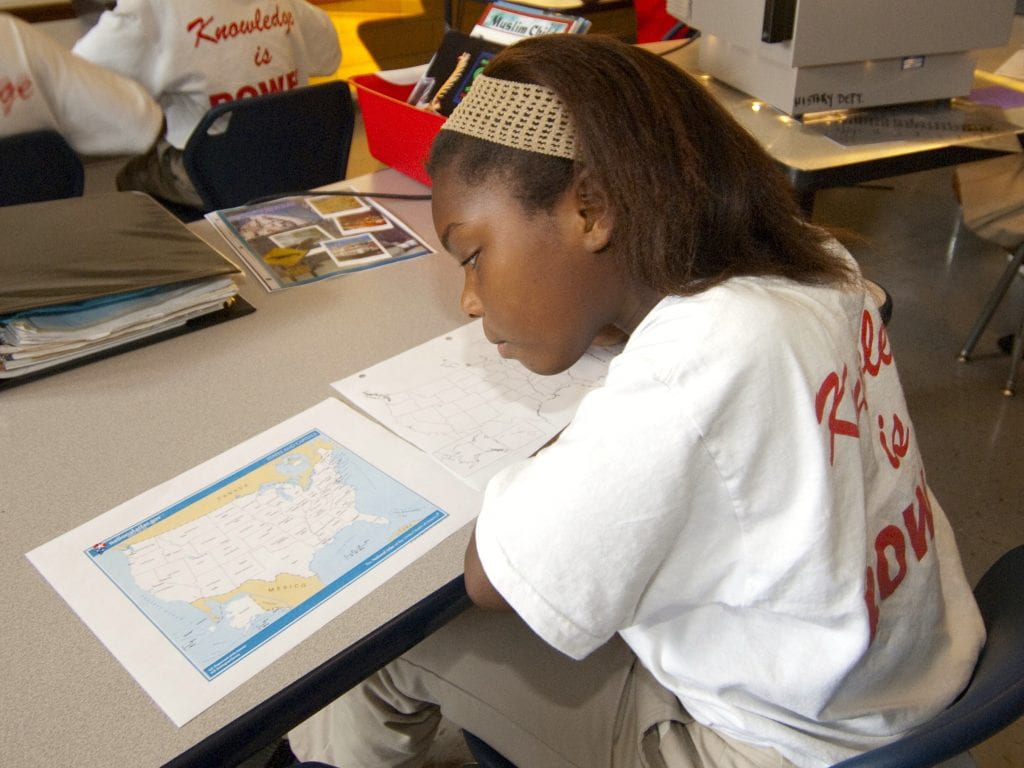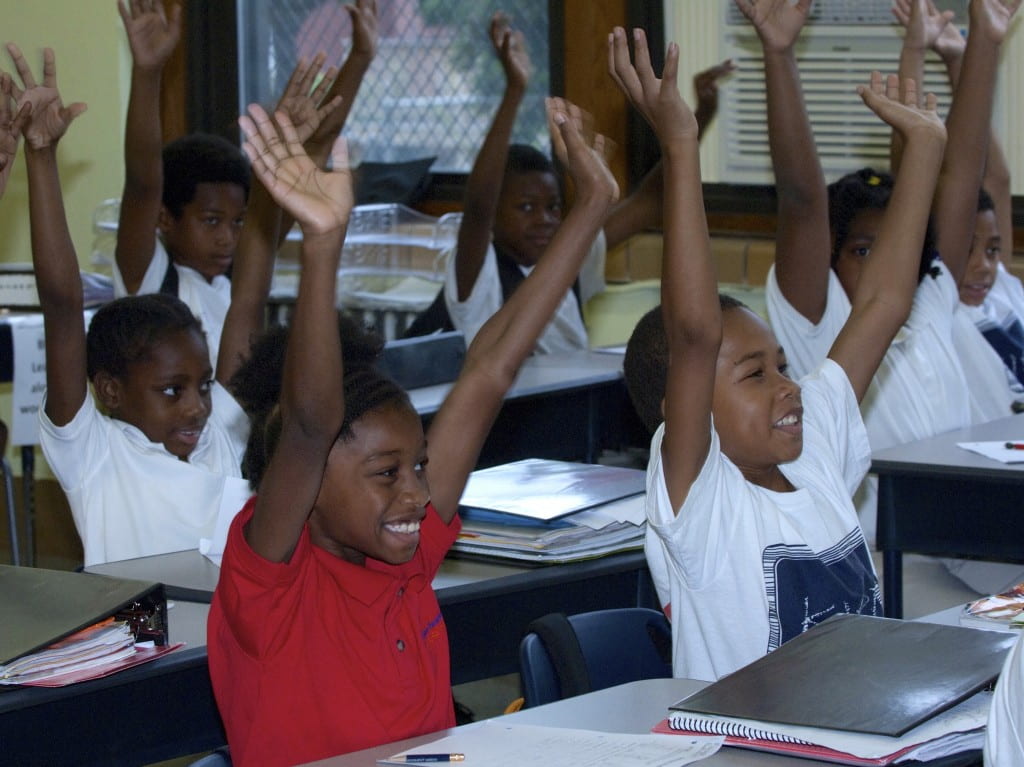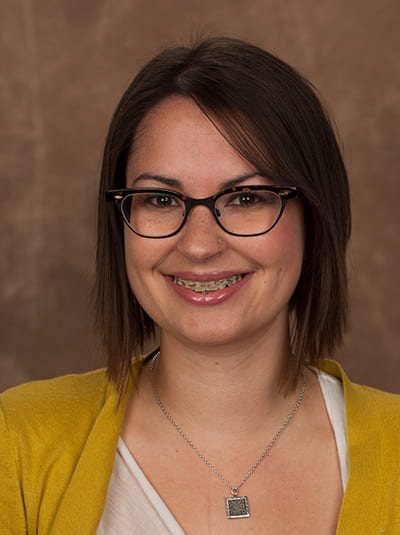In Brenice Lewis’ fifth-grade science classroom at KIPP Inspire Academy in South St. Louis City, a bright menagerie of jungle animals peers down over college logos and a collection of you-can-do-it! signs.
One, above the door, signals to all who enter that “future doctors, presidents, curers of diseases, famous authors…” are busy preparing for their future. That preparation often takes the form of open-ended questions.
“What could happen to an ecosystem with too many beavers?” is a query that sends two dozen hands up in the air.
“The population of trees would be less,” volunteers one student. “Then birds would have to find a different habitat,” another adds.
“That’s a good connection!” Lewis confirms, understanding that critical thinking is an essential steppingstone on the way to college, a path every Inspire student is expected to take, with Washington University’s Institute for School Partnership (ISP) at their side.
Expanding Their World
Sponsored by Washington University, KIPP Inspire opened in 2009 as a public, charter middle school with a bold mission: to ensure that underserved students gain the skills and confidence they need to pursue higher education.
Parents whose children win the lottery system to attend KIPP Inspire become part of a team whose blueprint for success is multi-faceted. School days that start at 7:10 and continue until 5:00, high standards and praise for meeting them, and substantial teacher support from WUSTL are all components.
ISP Curriculum and Assessment Specialist Rachel Ruggirello is a key player whose job includes instructional planning and assessment design in partnership with science teachers. Every week, Ruggirello observes classes to better understand teachers’ needs. She assists them with long-term projects or overnight turn-arounds.
“If they want, for example, to do a lesson on electromagnetism, they might email me and say, ‘Can you help?’” Ruggirello says. “I can provide a lesson plan and materials and bring them over.”
Academic partnerships facilitated by Ruggirello also enhance learning. If a WUSTL faculty member is looking to research teaching a particular topic in a specific way, she’ll match that person to just the right teacher. The result can be life changing for students.
“The kids are able to see a real scientist and have a mentoring relationship with them,” Ruggirello explains.
Under Ruggirello’s guidance, KIPP Inspire is one of only two St. Louis Public schools to participate in the regional Science Olympiad competition. Local-level events have taught students about engineering design principles through activities such as the rotor egg-drop contest, and about deductive reasoning through you-solve-it Crimebusters assignments. The Olympiad also broadens their world beyond their neighborhood.
“They can meet peers throughout the whole region rather than just being isolated,” Ruggirello says. “They get to experience competing with students at many other schools.”
‘The Fundamental Difference’
KIPP Inspire school leader Jeremy Esposito references another stellar local school to show how far his KIPP students have come. Fewer than 5 percent of the first batch of fifth-graders at Inspire tested as proficient or advanced on the math section of the Missouri Assessment Program (MAP) when they were in fourth grade. But by the time those students reached eighth grade in 2013, that figure had skyrocketed to nearly 71 percent.
“We’re taking these kids who’ve been chronically undeserved, in terms of education, and proven they can actually excel at the level of students in Clayton, if they are given the appropriate environment and structure,” Esposito says.
Historical data for KIPP Inspire students on the MAP test in math, communication arts, and science provide evidence that the longer a student remains at KIPP, the higher their academic achievement.
The numbers are hard evidence of something intangible: a culture of success, where achievement is built into the structure of the school, and teacher support as a lynchpin.

Students in Ms. Andrea Turner’s 5th Grade Writiing Class.
Photos by Joe Angeles
“When you get great teachers and empower them to do great things and coach them and give them access to resources, that makes the fundamental difference,” Esposito says.
Vicki May, executive director of the Institute for School Partnership, explains that there’s no room for failure in an atmosphere of complete and total support.
“It’s our responsibility not just to teach but also to make sure they learn, that they really get it,” May says.
Providing that kind of fail-proof safety net isn’t just a job or even a mission, according to May. It’s a moral imperative.
“An excellent education should be a right,” May says.
Next Stop: High School
In fall 2013, the first contingent of Inspire-educated students marched forward to high school. Kids who once performed below grade level are now thriving at MICDS, Cardinal Ritter, CBC, Chaminade, St. Louis University High School, and Metro Academic and Classical High School and Gateway STEM Academy, magnet schools in St. Louis Public.
It’s the job of Inspire’s Molly Joyce to match graduating students with the best high school. As director of high school placement, Joyce begins talking with students in seventh grade about where they might spend their high school years. But the process starts long before then, with banners representing the area’s top schools in school halls serving as signposts toward the future for incoming fifth-graders.
An important part of Joyce’s work is building relationships with parents, who have bigger dreams for their children than they may have ever imagined for themselves.
“Establishing a high level of trust is incredibly key,” Joyce says.
Working with the parents involves listening as well as imparting information.
“Our parents want more for their kids, and we believe in helping families navigate all of their options,” Joyce says.
Pinpointing a high-school fit is just the start of the journey, which also includes helping with myriad details of the application process and the quest for tuition assistance. Even after students have gained acceptance to a school outside their area, another question often looms: how will they get there every day? Long, Metro bus rides transport some kids. Still, the destination can be a world away.
‘A Burst of Energy’
Former Inspire student Riva Carter has a clear plan for her future. “There’s no doubt I’ll be going to college,” the ninth-grader says.
But before Carter entered KIPP Inspire, higher education or even the importance of studying at all wasn’t even on her radar.
“When I first came to KIPP, I really didn’t care about school too much,” Carter remembers. “Now, I have this burst of energy every time I walk into school.”
Her epiphany came in sixth grade, after a year of solid support.
“The teachers just expected us to get good grades. They realized our potential, even though we didn’t,” Carter says.
Rewards along the way helped hammer home the message. Carter recalls a system in which students who do well can accumulate points toward Fun Friday events like an ice-cream social or dance party, or the privilege of wearing regular clothes for a day instead of a uniform.
Carter was also able to earn trips, like the one to Birmingham, Ala. in which she was inspired by a trip to the Civil Rights Institute.
Now she maintains a 3.6 grade point average at McKinley High School while helping lower performing kids there with their homework. As Carter pays forward the skills she learned at KIPP Inspire, she looks ahead to a bright future.
“I see myself being a lawyer, having a really good job, paying taxes on time, being married, having two kids,” Carter says. “Just being a successful person.”

